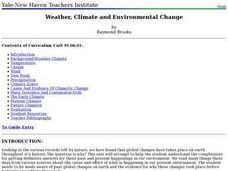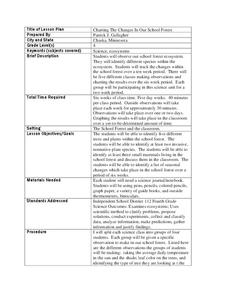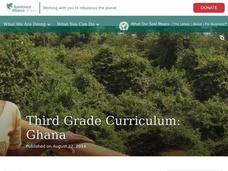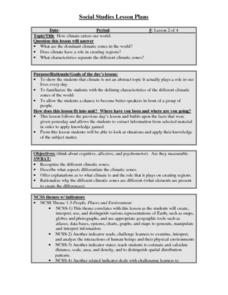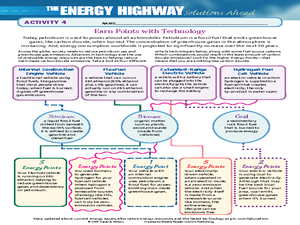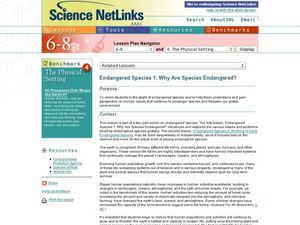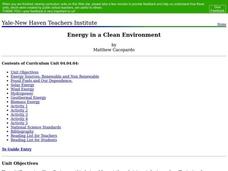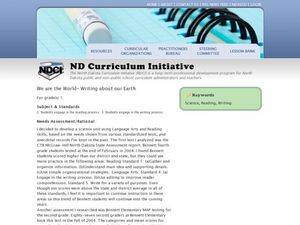Pace University
Grades 6-8 Ecology
Why are our national parks important? Scholars research the national parks and explore the basic ecology of these areas in a differentiated instruction unit on ecology. They learn about ecosystems, food chains, symbiosis, and biomes. The...
Curated OER
Weather, Climate and Environmental Change
Students study the complexities for getting definitive answers for past and present happenings in our environment. They discover past global changes on earth and the evidence for why these changes took place before believing everything...
Curated OER
A Thoreau Look at Our Environment
Sixth graders write journal entries o school site at least once during each season, including sketched and written observations of present environment. They can use sample topographical maps and student's own maps. Students can use...
Curated OER
Charting the Changes in Our School Forest
Fourth graders investigate the ecosystem and how forests are disappearing. In this environmental protection lesson, 4th graders analyze the changes in their school for 2 weeks. Students practice identifying trees, birds, and foliage...
Curated OER
Surviving in Our Ecosystems
Third graders investigate the balance of ecosystems and how each species has different survival needs. They research on the internet using the site included. They then participate in activities/centers utilizing the facts they discovered.
Advocates for Human Rights
The Right to a Clean Environment: Water
First, young citizens learn about water consumption by doing some research themselves on their home water usage and sharing their findings with the class. Then, they do some brainstorming and devise a plan to reduce water consumption.
Curated OER
How climate enters our world
Students recognize the different climatic zones. They describe what aspects differentiate the climatic zones. Students offer explanations as to what climate is and the role that it plays on creating regions. They rationalize why the...
Curated OER
Waste Minimization and Protecting the Environment
Learners study the amount of waste produced and its effects on the environment. They discuss food, money, and energy and how their waste effects others. They read a play to explore how waste is produced and create a collage of...
Curated OER
Earn Points with Technology
Students explore renewable energy by analyzing a diagram. In this fossil fuel activity, students view a chart explaining the different energy consumption from automobiles and how they impact our environment. Students analyze a point...
Curated OER
Toxic River
Students explore environmental safety by participating in a class game. In this toxic chemicals lesson, students discuss the effect chemicals have on our environment and how to best protect against their dangers. Students participate in...
Curated OER
Endangered Species 1: Why are Species Endangered?
Emerging ecologists examine endangered species by visiting the US Environmental Protection Agency website. They consider human contribution to the decline of different species. They research an endangered animal and then craft a poster...
Curated OER
How Can We Live Here? Life In Extreme Environments
Students explore the limits of life on Earth to extend their beliefs about life to include its possibility on other worlds. They investigate three hypothetical environments and the bacterial life forms that could exist on Earth.
Curated OER
Are You Balanced With Your Environment?
Students discuss the impact of not keeping the environment in balance for future generations. As a class, they are introduced to the concept of "Balance of Nature" and what it means. In groups, they research the role of trees and how to...
Curated OER
Energy in a Clean Environment
Students examine the efficiency of each alternative energy source as well as what limitations exist in terms of extracting the usable energy. They determine which energy source is most effective to the economy and the environment in the...
Curated OER
We are the World - Writing about our Earth
First graders write facts about the Earth. In this Earth lesson, 1st graders discuss natural resources, recycling, and how to keep the Earth clean. They work in groups to create a small book with 3-5 facts about the Earth's environment.
Curated OER
Interactions Everywhere!
Students examine interactions within the environment and environmental engineering careers. They discuss and view photos of natural and manmade environments, explore various websites, create a web to identify interactions between living...
Curated OER
Shrinking Spaces
Students describe the impact of population growth on the environment. They describe how cities affect their surrounding environment and explain how cities are handling growth and its resulting effect on the quality of life. They visit...
Curated OER
Saving the Sandhill Cranes
Students explore environmental awareness by participating in movie making. In this endangered species lesson, students discuss the problems dealing with sandhill cranes at a nearby beach and the impact our environment is having on them....
Curated OER
Observing and Sketching the Lunar Surface
Learners explore space science by conducting an illustration activity. In this lunar instructional activity, students discuss what the moon is and the role it plays for our environment on Earth. Learners view images of the moon and...
Curated OER
Where does our food come from?
Learners invetigate farms and where food comes from. They think about where food comes from and how it gets to the shops.
California Academy of Science
Human Evolution
As the great and hilarious Tim Minchin once said, "Science is simply the word we use to describe a method of organizing our curiosity." Science is more than just a guess; it is based on questions, observations, and evidence. High...
National Wildlife Federation
Quantifying Land Changes Over Time Using Landsat
"Humans have become a geologic agent comparable to erosion and [volcanic] eruptions ..." Paul J. Crutzen, a Nobel Prize-winning atmospheric chemist. Using Landsat imagery, scholars create a grid showing land use type, such as urban,...
Curated OER
Quilting Our Diverse Classroom
Students explore diversity and race by creating art. In this ethnic background lesson, students discuss their family history, where their relatives lived and how it affects their life today. Students create pieces of a quilt representing...
Curated OER
Understanding Biodiversity Via Ecological Footprints
Sixth graders investigate the ways in which human beings impact the environment and ecology through the calculation of their own ecological footprint, discussion questions pertaining to biodiversity and potential imbalance hazards, and...
Other popular searches
- Caring for Our Environment
- Protecting Our Environment
- Preserving Our Environment
- Care for Our Environment
- Safe Our Environment
- Lessons Our Environment
- Primary: Our Environment
- Plants and Our Environment
- Water and Our Environment
- Geometry in Our Environment
- Primary Our Environment
- Helping Our Environment



